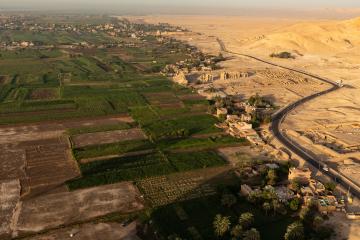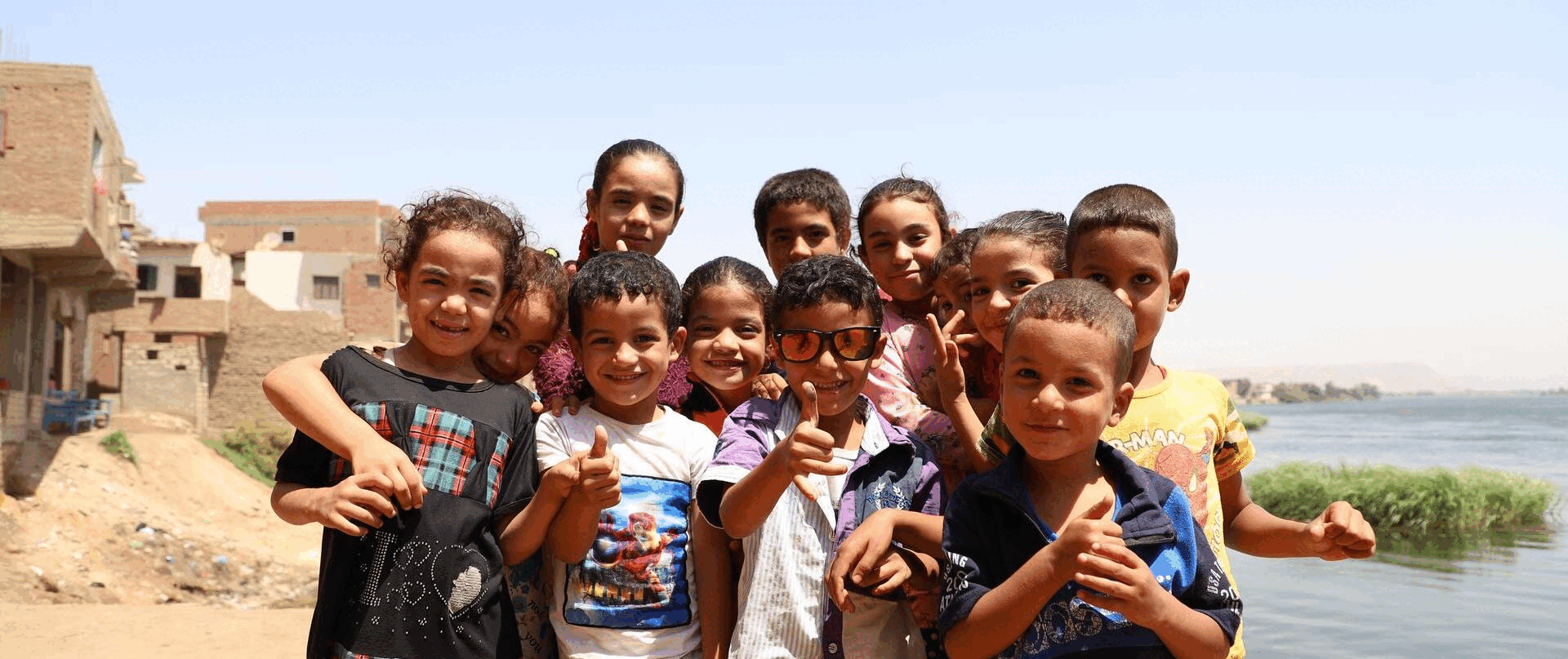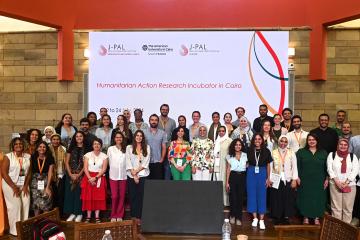
Egypt Impact Lab: Making every Egyptian pound spent on development count

Before sunrise, in a working-class neighborhood in Cairo, a father of three begins his day with a familiar ritual—balancing his family’s needs against their limited income. He navigates a complex web of public services: subsidized bread, healthcare access, and his children’s education. Each policy made at a macro-level ripples through his family’s daily reality. How can policymakers ensure that the billions of Egyptian pounds spent annually on national programs effectively reach families like his and create meaningful change?
This question catalyzed an unprecedented collaboration in 2022 between researchers and policymakers to establish the Egypt Impact Lab (EIL), launching a systematic approach to evaluate which poverty alleviation policies truly work and, more importantly, why. The partnership between J-PAL MENA and Egypt's Ministry of Planning, Economic Development, and International Cooperation transforms decision-making that affects millions of Egyptian families.
The stakes for households struggling to make ends meet could not be higher. Every policy shift, from healthcare delivery to conditional and unconditional cash transfers to education reform carries real consequences. The lab’s mission is clear: ensure that finite government resources create maximum impact for vulnerable households. By rigorously evaluating programs before scaling them nationwide, EIL can help prevent the costly implementation of ineffective policies while identifying and expanding solutions that address people’s needs.
Embedding evidence into action
The EIL’s integration into the formal structure of the National Institute for Governance and Sustainable Development in 2024 marked a turning point in Egypt’s commitment to evidence-based governance. This strategic institutional positioning enhances the lab’s capacity to drive impact in three pillars:
- Generating evidence on the government’s priority themes, primarily targeting national flagship programs.
- Building the capacity of policymakers and practitioners to use evidence through sharing insights and actionable recommendations from research, as well as diverse capacity-building offerings.
- Strengthening the knowledge ecosystem by developing a new generation of researchers in MENA who can conduct rigorous evaluations, leverage administrative data for better decision-making, and strengthen the links between low- and middle-income countries to exchange experiences on scaling up effective programs based on evidence.
Current EIL initiatives focus on shaping effective solutions in the thematic areas of social protection and poverty alleviation, gender empowerment and family development, education, employment, and MSME development.
In 2024, EIL also expanded its scope by establishing the Hub for Advanced Policy Innovation for the Environment (HAPIE); as J-PAL MENA’s regional Air and Water Lab, HAPIE addresses critical environmental challenges through evidence-driven solutions in water resource management, sustainable energy, climate change adaptation, and waste management.
Transforming lives: Stories of impact
EIL is driving evidence-based solutions across multiple sectors, ensuring that policies and programs are informed by rigorous research. From enhancing social protection and financial inclusion to advancing gender empowerment and education reform, the lab's initiatives are shaping more effective and sustainable development strategies.
Under its Social Protection and Poverty Alleviation thematic area, the EIL is collaborating with the National Organization for Social Insurance to identify strategies for improving enrollment and participation in the social insurance system, particularly among informal workers, and the most effective targeting methods for reaching these populations.
The EIL is also exploring a groundbreaking collaboration with the Ministry of Justice to address debtors’ prisons in Egypt, seeking to provide empirical evidence on its social costs and financial market implications. This research will offer critical insights into the consequences of debtors’ prisons and guide reforms to promote financial stability. Additional studies with microfinance institutions will examine how access to credit influences borrower behavior, particularly whether certain lending practices encourage risky financial decisions, enabling EIL to deliver actionable policy recommendations.
EIL’s Gender Empowerment and Family Development projects are helping rewrite narratives for women and girls. The Tahweesha initiative, a digital savings platform, empowers rural women to take control of their finances. This initiative represents collaborative efforts with the National Council for Women and international partners to advance gender equality in financial inclusion and economic empowerment.
Within the Education, Employment, and MSME Development thematic area, EIL is partnering with the Ministry of Education and Technical Education to support the Technical Education 2.0 reform strategy. The effort aims to transform technical education through competency-based learning, skills development, and public perception shifts to reduce the stigma associated with technical education. EIL is also exploring collaborations with the Central Bank of Egypt on financial inclusion projects, such as the School Bank program, which enhances financial literacy among students. These efforts emphasize evidence-informed approaches to improving education quality and labor market outcomes in Egypt.
The partnerships driving EIL’s progress
The lab’s success builds on strong partnerships with Community Jameel and the Sawiris Foundation for Social Development (SFSD).
Community Jameel is an independent, global organization that advances science and learning for communities to thrive, and is a founding partner of J-PAL. Promoting evidence-based policymaking has been core to Community Jameel’s work since its foundation more than 20 years ago. Through the fostering of close partnerships with governments, academics, researchers and other institutions, the practice of implementing policies rooted in scientific evidence and research has demonstrated the ability to positively impact millions of lives globally.
The Sawiris Foundation for Social Development is a homegrown impact investor and curator of effective developmental solutions to reducing multidimensional poverty in Egypt. SFSD’s responsibility extends beyond grantmaking into being enablers of developmental knowledge, making them key actors in Egypt’s sustainable development, as well as technical partners constantly learning the most effective solutions in addressing the challenges facing our society.
SFSD values its collaboration with the Egypt Impact Lab in advancing capacity building and strengthening the capabilities of Egyptian change makers, local partners, and the broader ecosystem through evidence-based approaches in development. With the EIL, access to crucial skills and tools is made possible that allow us to work with lifesaving knowledge and build long-term institutional intelligence within Egyptian public policy.
Additional support from UNICEF Egypt and strategic partners, such as the Ministry of Social Solidarity (MoSS), the Ministry of Education and Technical Education (MoETE), the Islamic Development Bank (IsDB), the Central Bank of Egypt (CBE), the Micro, Small, and Medium Development Agency (MSMEDA), and the National Council for Women, made the EIL possible.
These partnerships represent a shared commitment to transforming Egypt’s development landscape through evidence-based policymaking. By harnessing the expertise, networks, and dedication of key stakeholders, the EIL is poised to expand its impact, ensuring that research-driven insights translate into meaningful and lasting policy reforms. Looking ahead, the Lab will continue to strengthen collaborations, scale proven interventions, and cultivate a dynamic ecosystem where evidence-informed decisions drive sustainable and inclusive development across Egypt.
Join the transformation
Ready to contribute to evidence-based solutions? Contact the EIL coordinators, Rahma El Gheriany ([email protected]) and Zeina Osama ([email protected]), to propose research projects, partner on evaluations, support ongoing initiatives, or join capacity-building programs.





